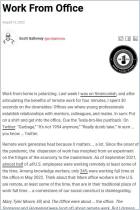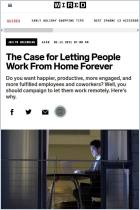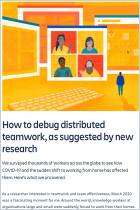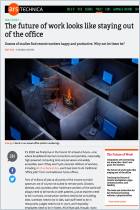
Article
Our Remote Work Future Is Going to Suck
Why are we always assuming a distributed workforce is a good thing for the worker?
Recommendation
In this hard-nosed look at the touted benefits of remote work, Sean Blanda describes the darker side of a practice that COVID-19 thrust upon many employees. He considers whether remote work’s supposed independence, convenience and productivity come at too high a price. As the threat of COVID-19 levels off or, in time, recedes, Blanda recommends that companies offer employees flexible work options, rather than making remote work the defining feature of the future workplace.
Summary
About the Author
Sean Blanda is director of content for Crossbeam, a business-to-business SaaS company. He has also worked at InVision and Adobe.
Learners who read this summary also read
Article






















Comment on this summary or 开始讨论